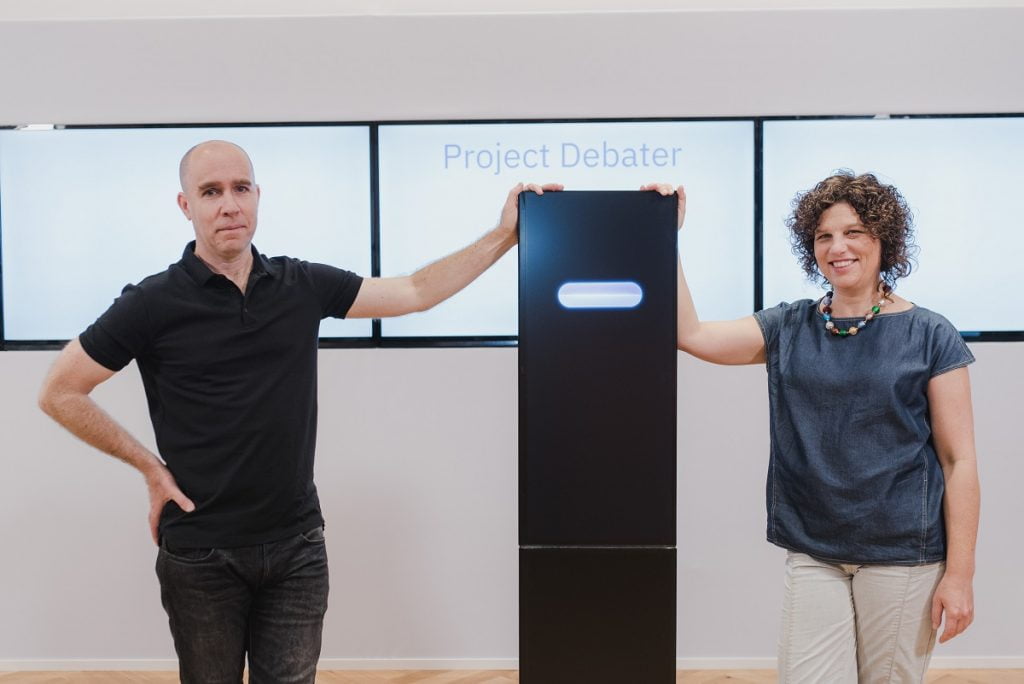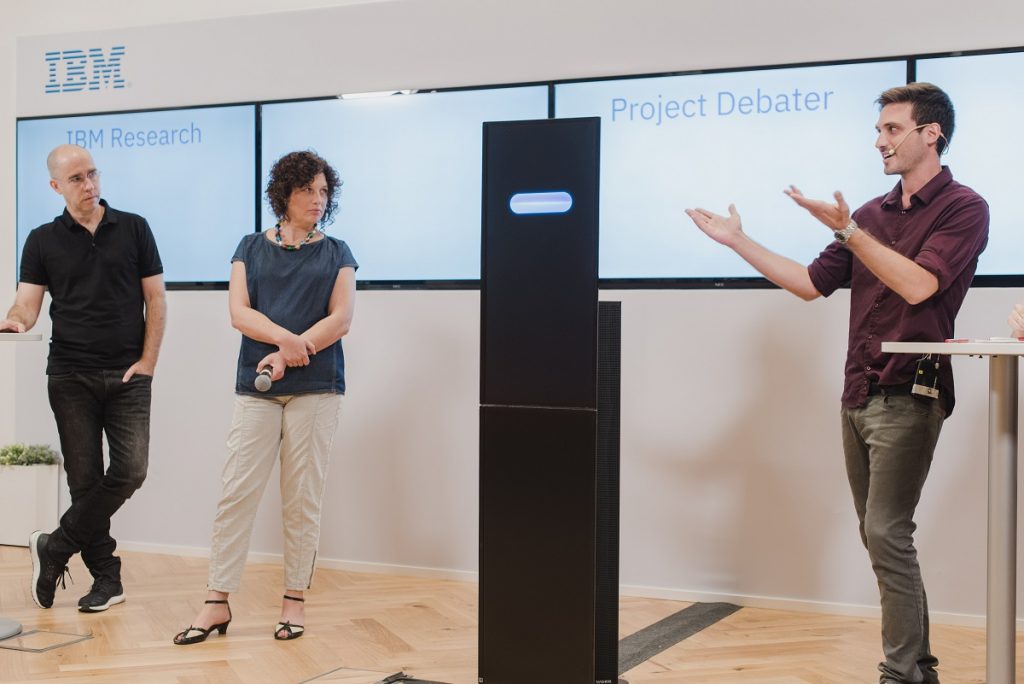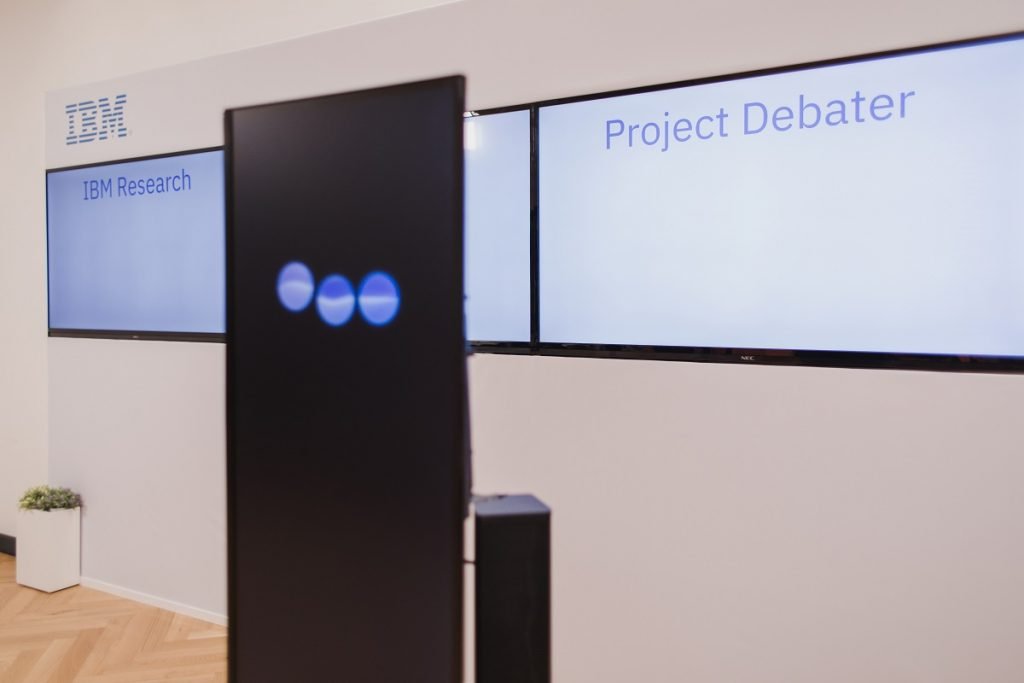IBM, the American multinational technology company, unveiled a unique project last month that made international headlines: a system powered by artificial intelligence (AI) that can debate humans.
Dubbed Project Debater, it was developed over six years in IBM’s Haifa research division in Israel.
At the unveiling two weeks ago in San Francisco, the system engaged in its first-ever live, public debate. Its opponents were two Israeli debate champions. Israel’s 2016 debate champion Noa Ovadia took on the system for a discussion on whether space exploration should be subsidized by the government. Dan Zafrir, a professional debater, argued Project Debater on the value of telemedicine and whether it should be used more widely.
Each side delivered a four-minute opening statement, a four-minute rebuttal, and a two-minute summary, according to a June 18 post by IBM Research Director Arvind Krishna
The humans were said to have won, but by a close call. According to anaudience survey cited by Krishna in an interview with Fox News, the computer lacked the persuasive speaking nuances of the debate champs but possessed more knowledge on the topics. Krishna wrote that IBM “selected from a curated list of topics to ensure a meaningful debate. But Project Debater was never trained on the topics.”
This week, Project Debater performed once again against two human debaters, this time in Israel where the team behind the project proudly displayed it.
At the event at IBM’s Givatayim offices held for local press, the system this time challenged Israeli professional debaters Yaar Bach and Hayah Goldlist-Eichler on mass surveillance methods, and genetic engineering, respectively.
IBM’s Israel CEO and country manager Daniel Melka told the audience that the company developed “very special technology” that is “a significant milestone in the development of Artificial Intelligence technology,” according to the Times of Israel.
In a video presentation ahead of the unveiling, Noam Slonim, the principal investigator of Project Debater and senior technical staff member (STSM) at the IBM Haifa Research Lab, said the goal of the project was “to demonstrate that we can have a meaningful and viable discussion between men and machine.”
Project Debater, Krishna wrote, “moves us a big step closer to one of the great boundaries in AI: mastering language. It is the latest in a long line of major AI innovations at IBM, which also include “Deep Blue,” the IBM system that took on chess world champion Garry Kasparov in 1997, and IBM Watson, which beat the top human champions on Jeopardy! in 2011.”
IBM’s recent developments in machine thinking surpass that of existing products such as Apple’s Siri and Amazon’s Alexa. These devices primarily recite rote information, whereas Project Debater uses facts to reason and construct arguments on topics that have no right or wrong answers. According to IBM, the technology accomplishes this through first recognizing opponents’ arguments through Watson Speech to Text. Then, it identifies relevant expressions in its database of hundreds of millions of articles from trusted journals and magazines. Lastly, it eliminates redundancies, prioritizes arguments and composes coherent English speech.
“Subsidizing space exploration is like investing in really good tires,” Project Debater rebutted Ovadia in the government-sponsored space research debate in San Francisco. “It may not be fun to spend the extra money, but ultimately you know both you and everyone else on the road will be better off.” It further argued that space exploration also inspires the younger generation to pursue careers in science and technology.
The computer also attempted to make jokes during the debate. “You are speaking at the extremely fast rate of 218 words per minute. There is no need to hurry,” Project Debater told Ovadia.
Up against Zafrir in the telemedicine debate, the system admonished its opponent saying: “Fighting technology means fighting human ingenuity.”
And in the debate this week against Goldlist-Eichler, who, for the sake of argument expressed her suspicions ofthe safety of technological advancement, Project Debater said: “I can’t say this is getting on my nerves, because I don’t have any.”
Sign up for our free weekly newsletter
Subscribe
Noam Slonim, left, and Dr. Ranit Aharonov, right, from IBM’s research lab in Haifa. Photo by Or Kaplan
The project is being hailed as the onset of a new era for human-machine interaction. Krishna says IBM’s mission was to develop broad AI that learns across different disciplines to augment human intelligence.
“AI assistants have become highly useful to us through their ability to conduct sophisticated keyword searches and respond to simple questions or requests (such as “how many ounces in a liter?” or “call Mom”),” he wrote, adding that Project Debater “explores new territory” by absorbing “massive and diverse sets of information and perspectives to help people build persuasive arguments and make well-informed decisions.”
IBM proposes this precise idea behind the merits of Project Debater.
“The value of this technology is really to allow decision makers to take more informed decisions,” Slonim stated at the unveiling. Dr. Ranit Aharonov, a manager on Project Debater team at the IBM Haifa Research Lab, also elaborated that the team hopes the intelligent machine will augment conversation through stating relevant facts and arguments. This assists legislators and day-to-day users through “providing compelling, evidence-based arguments and limiting the influence of emotion, bias, or ambiguity,” according to the project’s official site.
And Krishna said Project Debater could become “the ultimate fact-based sounding board without the bias that often comes from humans.”
The limitations
Project Debater has its limitations. The system is currently programmed to follow a strict 20-minute debate format for 100 topics, according to The New York Times.
Furthermore, Wired magazine reported that Project Debater sometimes failed to address certain points and to construct rebuttals in line with the opponents, and provide real-life context for its arguments.
Krishna acknowledged that building the system was a “remarkably difficult and complex challenge,” and that it makes mistakes, “just like people.”
Though the Israeli team built Project Debater with three ground-breaking AI capabilities (data-driven speech writing and delivery, listening comprehension that can identify key claims hidden within long continuous spoken language, and modeling human dilemmas in a unique knowledge graph to enable principled arguments), the system must still learn to “adapt to human rationale and propose lines of argument that people can follow.”
“Debate rules stem from a human culture of discussion and are not arbitrary, and the value of arguments is often inherently subjective…In debate, AI must learn to navigate our messy, unstructured human world as it is – not by using a pre-defined set of rules, as in a board game,” he wrote.
AI potential
Similar projects in the AI sphere include Google Duplex, a conversation chatbot capable of rapid reasoning to maintain conversation with humans. Notably, it mimics speech nuances including hesitation after hearing a complex sentence, restatement during interruptions and the use of filler words.
Unlike Project Debater, which had a heavily robotic female voice, Duplex’s technology makes it sound like an authentic person. The tech, also developed in Israel, was unveiled in May at Google’s annual I/O developer conference in Mountain View, California, where CEO Sundar Pichai aired a recorded phone call of the system making a haircut appointment.
SEE ALSO: Need A Dinner Reservation? Israeli Tech Powers Google’s New Human-Sounding Assistant To Book It
At the same time, Microsoft has developed Xiaoice, a Chinese human-imitating chatbot capable of handling similar tasks through telephone.
These innovations did not suddenly arise without previous efforts. As Krishna mentioned, in 1997, IBM developed Deep Blue, a chess-playing computer that defeated Russian grandmaster Gary Kasparov. This was proceeded by Watson, another IBM computer that defeated champions Brad Rutter and Ken Jennings in Jeopardy in 2011. More recently in 2017, Google’s DeepMind developed AlphaGo, which defeated world champion Ke Jie in Go, claimed to be the world’s most complex game. These developments attest to the tremendous potential of intelligent computer thinking.
Related posts

Editors’ & Readers’ Choice: 10 Favorite NoCamels Articles

Forward Facing: What Does The Future Hold For Israeli High-Tech?

Impact Innovation: Israeli Startups That Could Shape Our Future





Facebook comments